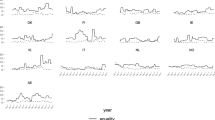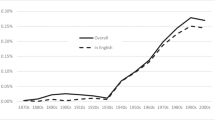Abstract
As interpretations of results from small-scale research sites are incomplete without consideration of the social structures that frame them (Block, in: Gardner, Martin-Jones (eds) Multilingualism, discourse and ethnography, Routledge, New York, 2012), the current study uses the theoretical lens of agency to examine the language policies of four of Istanbul’s Kurdish-owned eating establishments with respect to socio-political structures. Set in a context in which Turkish nationalist ideologies trickle down to long-standing and pervasive stigma toward Kurdish at local levels (Coşkun et al. in Scar of tongue: consequences of the ban of the use of mother tongue in education and experiences of Kurdish students in Turkey, DISA, Diyarbakır, 2011; Saraçoğlu in Kurds of modern Turkey: migration, neoliberalism, and exclusion in Turkish society, Tauris Academic Studies, New York, 2011; Polat in Crit Inq Lang Stud 8:261–288, 2011; Schluter and Sansarkan in Içduygu, Göker (eds), Rethinking migration and integration: bottom-up responses to neoliberal global challenges, The Isis Press, Istanbul, 2014), Kurdish workplaces represent rich sites for investigating the relative influence of differently scaled structures on individual free will. Based on ethnographic data collected through observations and interviews, the results, which align with Ortner’s (Anthropology and social theory: culture, power, and the acting subject, Duke University Press, Durham, 2006) and Archer’s (Being human: the problem of agency, Cambridge University Press, Cambridge, 2000, Making our way through the world: human reflexivity and social mobility, Cambridge University Press, Cambridge, 2007) conceptualizations of agency, indicate that while structures severely constrain managers’ ability to determine policy, a small number of opportunities also exist to resist these structures. In contrast to much of the literature that emphasizes the dominance of global scales in the current neoliberal era (Cf. Heller in J Socioling 7(4):473–492, 2003; Blommaert in The sociolinguistics of globalization, Cambridge University Press, Cambridge, 2010; Flubacher and Del Percio in Language, education and neoliberalism: critical studies in sociolinguistics, Multilingual Matters, Bristol, 2017; Lorente in Scripts of servitude: language, labor, migration, and transnational domestic work, Multilingual Matters, Bristol, 2017; Block in Political economy in sociolinguistics: neoliberalism, inequality and social class, Bloomsbury, London, 2018), nationally scaled structures feature most prominently. A center-periphery distinction emerges with respect to the magnitude of the nation’s influence over policy: peripherality, in agreement with Kelly-Holmes (in: Pietikäinen, Kelly-Holmes (eds) Multilingualism and the periphery, Oxford University Press, Oxford, 2013) and Hiss (Lang Soc 46:697–718, 2017), comes with diminished pressure to adhere to the norms of the center. These findings both underline the considerable power of Turkish national structures over individuals in this setting while indicating a small space for alternative marketplaces (Woolard in Am Ethnol 12:738–748, 1985).

Similar content being viewed by others
Notes
There are numerous examples from different contexts in which Kurdish speakers were mistreated, abused, and even killed for speaking or singing in Kurdish even during the Kurdish Opening. In terms of singers, these include Aynur Doğan’s Kurdish-language contribution to the Istanbul Jazz Festival in July of 2011 that was cut short by hostile audience members who launched projectiles and chanted nationalist slogans at her (Radikal 2011). A Kurdish man in the Avcilar district of Istanbul was killed in the fall of 2015 for singing in Kurdish (Umut Gazetesi 2015). In terms of citizens on the streets, a Kurdish hotel worker and his cousin were attacked in the fall of 2014 by a mob of fifteen men in Antalya for speaking Kurdish. One of the men died, and the other was severely injured (Radikal 2014). In the Kagithane district of Istanbul during the fall of 2015, a recent migrant from the Kurdish region of Batman was stabbed by six men while speaking Kurdish on his cell phone at a bus stop (Turgut 2015).
References
Ahearn, L. M. (2001). Language and agency. Annual Review of Anthropology, 30, 109–137.
Archer, M. S. (2000). Being human: The problem of agency. Cambridge: Cambridge University Press.
Archer, M. S. (2007). Making our way through the world: Human reflexivity and social mobility. Cambridge: Cambridge University Press.
Beck, U., & Beck-Gernsheim, E. (2002). Individualization. London: Sage.
Block, D. (2012). Unpicking agency in sociolinguistic research with migrants. In S. Gardner & M. Martin-Jones (Eds.), Multilingualism, discourse and ethnography (pp. 47–60). New York: Routledge.
Block, D. (2018). Political economy in sociolinguistics: Neoliberalism, inequality and social class. London: Bloomsbury.
Blommaert, J. (2007). Sociolinguistic scales. Intercultural Pragmatics, 4(1), 1–19.
Blommaert, J. (2010). The Sociolinguistics of globalization. Cambridge: Cambridge University Press.
Blommaert, J. (2015). Chronotopes, scales, and complexity in the study of language in society. Annual Review of Anthropology, 44, 105–116.
Blommaert, J., Collins, J., & Slembrouck, S. (2005a). Spaces of multilingualism. Language & Communication, 25, 197–216.
Blommaert, J., Muyllaert, N., Huysmans, M., & Dyers, C. (2005b). Peripheral normativity: Literacy and the production of locality in a South African township school. Linguistics and Education, 16, 378–403.
Bourdieu, P. (1977). Outline of a theory of practice. Cambridge, U.K.: Cambridge University Press.
Bourdieu, P. (1982). Ce que parler veut dire: l’économie des échanges linguistiques. [What speaking means: The economy of linguistic exchanges] Paris: Fayard.
Coşkun, V., Derince, M. Ş., & Uçarlar, N. (2011). Scar of tongue: consequences of the ban of the use of mother tongue in education and experiences of Kurdish students in Turkey. Diyarbakır: DISA.
Duchêne, A., & Heller, M. (2012). Language in late capitalism: Pride and profit. New York and Oxon: Routledge.
Flubacher, M.-C., & Del Percio, A. (Eds.). (2017). Language, education and neoliberalism: Critical studies in sociolinguistics. Bristol: Multilingual Matters.
Giroux, H. A. (1983). Theories of reproduction and resistance in the new sociology of education: A critical analysis. Harvard Educational Review, 53(3), 257–293.
Goffman, E. (1956). The presentation of self in everyday life. Edinburgh: The University of Edinburgh Social Sciences Research Center.
Heller, M. (2003). Globalization, the new economy, and the commodification of language and identity. Journal of Sociolinguistics, 7(4), 473–492.
Hiss, F. (2017). Workplace multilingualism in shifting contexts: A historical case. Language in Society, 46, 697–718.
Hornberger, N. H., & Johnson, D. C. (2007). Slicing the onion ethnographically: Layers and spaces in multilingual education policy and practice. TESOL Quarterly, 41(3), 509–532.
Hult, F. (2010). Analysis of language policy discourses across the scales of space and time. International Journal of the Sociology of Language, 202, 7–24.
Içduygu, A., Romano, D., & Sirkeci, İ. (1999). The ethnic question in an environment of insecurity: The Kurds in Turkey. Ethnic and Racial Studies, 22(6), 991–1010.
Kelly-Holmes, H. (2013). Translation in progress: Centralizing and peripheralizing tensions in the practices of commercial actors in minority language sites. In S. Pietikäinen & H. Kelly-Holmes (Eds.), Multilingualism and the periphery. Oxford: Oxford University Press.
Li, W. (2012). Introduction to Part I: Linking local practices to wider social processes. In S. Gardner & M. Martin-Jones (Eds.), Multilingualism, discourse and ethnography (pp. 19–23). New York: Routledge.
Lorente, B. P. (2017). Scripts of servitude: Language, labor, migration, and transnational domestic work. Bristol: Multilingual Matters.
Ortner, S. (2006). Anthropology and social theory: Culture, power, and the acting subject. Durham, NC: Duke University Press.
Pietikäinen, S., & Kelly-Holmes, H. (2013). Introduction to multilingualism and the periphery. In S. Pietikäinen & H. Kelly-Holmes (Eds.), Multilingualism and the periphery. Oxford: Oxford University Press.
Polat, N. (2011). Examining the nature and content of L2 socialization patterns: Attainment of a native-like Turkish accent by Kurds. Critical Inquiry in Language Studies, 8, 261–288.
Radikal. (2011). Caz festivalinde Kürtçe şarkı söyleyen Aynur yuhalandı [Kurdish singing Aynur brought down at the Jazz Festival]. 16 July. http://www.radikal.com.tr/turkiye/caz-festivalinde-kurtce-sarki-soyleyen-aynur-yuhalandi-1056494/. Accessed 12 Apr 2017.
Radikal. (2014). Kürtçe konuştuğu için’ 10 saniyede linç edilmiş!. [Lynched in ten seconds for speaking Kurdish!]. 13 November. http://www.radikal.com.tr/turkiye/kurtce-konustugu-icin-10-saniyede-linc-edilmis-1229771/. Accessed 20 Mar 2017.
Ricento, T., & Hornberger, N. (1996). Unpeeling the onion: Language planning and policy and the ELT professional. TESOL Quarterly, 30(3), 401–427.
Sakr, N. (2002). Satellite realms: Transnational television, globalization, and the Middle East. London: I.B. Taurus.
Saraçoğlu, C. (2011). Kurds of modern Turkey: Migration, neoliberalism, and exclusion in Turkish society. New York, NY: Tauris Academic Studies.
Schluter, A., & Sansarkan, M. (2014). Language choice as a function of power and solidarity in the Istanbul workplace. In A. Içduygu & Z. G. Göker (Eds.), Rethinking migration and integration: Bottom-up responses to neoliberal global challenges (pp. 127–175). Istanbul: The Isis Press.
Turgut, T. A. (2015). Telefonda Kürtçe konuşuyor’ diye öldürüldü [Killed when he said he was speaking Kurdish on the phone] 7 July. Evrensel News. https://www.evrensel.net/haber/260129/telefonda-kurtce-konusuyor-diye-olduruldu. Accessed 28 Mar 2017.
Umut Gazetesi. (2015). Kürtçe şarkı söylediği için öldürüldü, emniyet yalanlıyor [Killed for singing in Kurdish, Police lie], 25 October. http://umutgazetesi2.org/kurtce-sarki-soyledigi-icin-olduruldu-emniyet-yalanliyor/. Accessed 25 Mar 2017.
Urry, J. (2007). Mobilities. Cambridge: Polity.
Woolard, K. (1985). Language variation and cultural hegemony: Toward an integration of sociolinguistic and social theory. American Ethnologist, 12, 738–748.
Author information
Authors and Affiliations
Corresponding author
Ethics declarations
Conflict of interest
The author claims no conflict of interest.
Rights and permissions
About this article
Cite this article
Schluter, A. When socio-political pressure is more powerful than the boss: workplace language policies by Kurds that restrict Kurdish. Lang Policy 19, 339–361 (2020). https://doi.org/10.1007/s10993-018-9505-3
Received:
Accepted:
Published:
Issue Date:
DOI: https://doi.org/10.1007/s10993-018-9505-3




